In Ephesians, Paul has instructed his readers to live at peace with people they used to hate, and to begin loving their enemies instead. This is much easier said than done, so in Ephesians 3, Paul shows how he himself is doing this, and how his readers can follow in his example in loving their enemies, just as Jesus did. This is what we begin to learn in Ephesians 3:14-17.
In Ephesians 3:14-17, Paul instructs his readers to do the impossible by loving their enemies. This is much easier said than done, so Paul provides three resources that God has provided to help us do the impossible.

But first, we have two question from a reader about Jesus as the elect one, and how Jesus was morally perfect.
Question from a Reader
Here are two questions submitted by a reader named Michael Spina.
I have a couple of questions that I hope you’d be able to clear up for me; hopefully once and for all, because these questions have always creeped in throughout my spiritual journey. First, I’ll ask the question, and then I’ll express my thoughts behind each question so you have an idea of where I’m coming from. Please forgive any trespasses if any of my expressed thoughts cause offense.
1) If Jesus is the chosen one by God, and Jesus is God incarnate, then wouldn’t it make more sense to say that God reincarnated Himself into a man to redeem what has been lost, and those who believe and trust in Him will be elected to service? Wouldn’t that be more consistent to Jesus’ character/personhood?
Every time I read or hear that Jesus is the chosen one by God, I always tend to think “equal opportunity” – Why Jesus and not you or me or anyone else? It is the kind of statement that might cause the flaring up of jealous and/or resentful feelings. But wait a minute; Jesus is God incarnate! Of COURSE no one else, because we are not God. So if we are to be saved, only one of those among the God Head can be elected for the role as savior as opposed to one of us humans, right? Because we didn’t create ourselves. Only the creator of something has the real power to repair that something. But then of course there’s the fact that God knew all of us before He created us, and we all have our own purpose and shouldn’t compare ourselves to each other. So just as I can’t compare myself to other people, I shouldn’t compare myself to Jesus either. So I’m confused. Is Jesus God incarnate or isn’t He? If so, then how can we say that Jesus is chosen by God? We almost make it sound like they’re mutually exclusive. I just don’t know. I’m all over the place with this. I could use some biblical perspective from someone who I feel truly understands and embodies the spirit of Jesus (yes, I believe that to be you, Jeremy. No pressure of course☺️)
2) It is said that Jesus was the only perfect human that ever lived. But perfect at what exactly? Aren’t there a lot of things to be perfect at?
I once heard someone say somewhere along the lines that there was no single human being who was perfect except for Jesus, and Jesus was the only perfect human being that ever lived. But I find such statements to be vague. I mean, what is perfect? Is it never making a single mistake at anything in your life? If so, then Jesus never had to learn any life skills. He knew them and did them perfectly without slip or fall. Lets look at walking for example. It takes many falls before a child can make his or her first successful step. Was Jesus able to walk right after birth. I sincerely doubt it, because otherwise I would find that as a worthy miracle to record on the gospels. Also, would a perfect person have any struggles in life? Would a perfect person always get his or her way? Would a perfect person always be on everyone’s good side?
Thank you Jeremy for everything you do and the time you give myself and everyone else. I am truly grateful.
First of all, thanks for asking the questions. I have NEVER yet had a question that causes offense! I believe that all questions are good questions.
On your first question, I would not use the term “reincarnated” as that does not describe what happened to Jesus. Reincarnation is the view that a human died and then came back at a later time as someone (or something) else. It is not the same as resurrection either, since they come back as someone else … But that wasn’t really what your question was about. It was primarily about Jesus as the primary elect person of God.
(#AmazonAdLink) 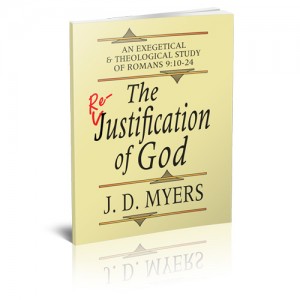 My answer is that yes, Jesus is the incarnation of God to redeem in humanity what was lost and broken. And yes, ALL who believe in Jesus for eternal life are chosen and elect in Him. There are some people in history who are chosen or elect but are not regenerate believers (such as Pharaoh in Exodus), but this is because they were chosen to perform a task. That’s all it means to be elect.
My answer is that yes, Jesus is the incarnation of God to redeem in humanity what was lost and broken. And yes, ALL who believe in Jesus for eternal life are chosen and elect in Him. There are some people in history who are chosen or elect but are not regenerate believers (such as Pharaoh in Exodus), but this is because they were chosen to perform a task. That’s all it means to be elect.
As I explain in my book (#AmazonAdLink) The Re-Justification of God, which you can get on Amazon, we are elect to service, not to eternal life. Since Jesus is elect, all who are in Him are also elect. That is, since Jesus was chosen to perform an important task, all who are in Him are also chosen to perform that same task … the redemption and reconciliation of the world. This is what discipleship is all about … following in the footsteps of Jesus to carry out the task that He started.
As to your second question, when people talk about the perfection of Jesus, they are referring primarily to the fact that Jesus was morally perfect. He never sinned.
I don’t think Jesus was the perfect tennis player, or had a perfect singing voice, or was perfect at math. Maybe some would disagree with me, but I tend to think that there are humans throughout history who were better than Jesus at such things. You know, Andre Agassi could have beaten Jesus at tennis. And according to Rolling Stones magazine, Aretha Franklin has the greatest voice of all time. I’m not sure I agree, but she did have a great voice, and I’m going to go out on a limb and say she probably had a better singing voice than Jesus. The same goes for difficult math problems. We don’t know how good Jesus was a math, but we can be certain that since Jesus would have had to learn math just like the rest of us, Jesus would have made math mistakes in the process of learning.
Remember, while Jesus is fully divine, He is also fully human, and as part of His humanity, He emptied Himself of certain characteristics of His divinity, which means He was not perfect in every conceivable way, but only the ways that mattered for Him to complete His mission of being the Savior of the world. So when we speak of the perfection of Jesus, we are referring only to moral perfection, so that Jesus could be sinless.
Interestingly, even when it came to moral perfection, Jesus still sinned when it came to certain moral standards of the religious leaders of His day. According to certain religious leaders of His day, Jesus hung out with the wrong people, ate the wrong foods … both of which were sinful … and spoke regularly against Moses and the temple. What this shows us that is just because religious leaders say something is sinful, this doesn’t mean it is sinful. Jesus truly was morally perfect from God’s perspective, but was a sinner and a blasphemer from the religious perspective, which is one reason they killed Him.
A little food for thought there…
Why It’s Not Impossible to Love our Enemies (Ephesians 3:14-17)
In Ephesians 3:14-19, Paul tells his readers that he is praying for them, and he tells them he has three specific prayer requests. We will look at this prayer over the course of two studies, but you should know that, at first glance, all three requests are for something impossible. Paul wants his readers to do what cannot be done, to know what cannot be known, and to be filled with that which they cannot be filled.
We will talk about all three of these as we study this prayer of Paul, but all three impossible prayer requests come down to one main point. It is the main point Paul has been writing about through all of Ephesians 2 and Ephesians 3. Paul wants the Ephesian Christians to live at peace with each other, and especially with those people that they used to hate. Paul wants his readers to love their enemies.
We all know that Jesus instructed us to love our enemies (Matt 5:43-48), but have you ever really tried it? If you ever have tried to actually show care and love for people who hate you and want to do harm to you, you know that it is impossible to even “get along” with them, much less love them.
But that’s what Paul wants us to do. Ephesians 2 was all about how Jesus loved His enemies, and so we should too. And in the first half of Ephesians 3, Paul is showing how he is seeking to love his enemies. And now, in Ephesians 3:14-19, Paul says that he is praying that his readers, which includes us, also learn to love our enemies.
As we will see, if we are going to do the impossible, namely, love our enemies, truly love them, … in other words, do what cannot be done (Eph 3:14-17) … then we need to know what cannot be known (Eph 3:17-18) and be filled with that which we cannot be filled (Eph 3:18-19).
Thankfully, we serve a God who relishes in doing the impossible. In fact, God can do far more than we ask, think, or even imagine (Eph 3:20-21).
The first step toward the impossible task of living at peace with others is to know that we are loved, and that God Himself is filling us to show this love to the world. That is what Paul explains in Ephesians 3:14-19. In this study we are looking at Ephesians 3:14-17, where Paul says he is praying that his readers can do what is impossible to do.

Let’s begin with Ephesians 3:14.
Ephesians 3:14. For this reason I bow my knees to the Father of our Lord Jesus Christ,
The term I bow my knees is an idiom, or a special way of saying, “I kneel.” So that is why some of your translations have made it more readable by writing, “For this reason I kneel before the Father.”
It is interesting that Paul uses this phrase though, because Jewish prayers were usually offered standing up. The only time Jews knelt was when they were in the presence of their King. Greeks did the same (Lk. 18:11-13). So Paul’s kneeling here is a sign that He sees God as His King, His Sovereign.
Paul kneels when he prays to Father. I am not saying this is the posture we must be in to pray. You don’t have to be kneeling to pray. Part of the wonder of prayer is that you can come to God in prayer anywhere, anytime, in any posture. There is no command in Scripture to physically kneel when you pray, but it should be the posture of our hearts.
Ephesians 3:15. … from whom the whole family in heaven and earth is named,
Paul is enjoying a little word play here. In Greek, the word for Father is pater, and the word for family is patria. So Paul is saying that we, the family, or patria of God is named after God the Father, the Pater.
But the significance of this is more important than the word play. Paul is going to write that he wants us to do the impossible, namely, to love those we don’t want to love. And right here in Ephesians 3:15 is the first bit of foreshadowing of how to do this.
One key to loving our enemies is to realize that they are not our enemies, but instead, are part of our family. We are all one family under God. In my podcast study on Genesis 4:8, I made the point that the first time sin is mentioned in the Bible, it is mentioned in context of one brother murdering another. This means that all violence against other humans is, in essence, violence against one of our brothers or sisters. We are all part of the same family, and so any violence or hatred against another human being is against a family member.
This is why Paul says in Ephesians 6:12 that our struggle is not against flesh and blood. Our struggle is not against one another, for we are all part of the same family.
With this in mind then, Paul mentions three prayer requests in Ephesians 3:15-19 that he prays for. The first is in Ephesians 3:16-17. It is a prayer for power to do what cannot be done.

Prayer for Power (Ephesians 3:16-17)
Ephesians 3:16-17. … that He would grant you, according to the riches of His glory, to be strengthened with might through His Spirit in the inner man, that Christ may dwell in your hearts through faith; that you, being rooted and grounded in love,
This is a very poor translation. It makes it appear that there are three separate requests here when in fact there is only one. A better translation would be
That He would grant you, according to the riches of His glory, to be strengthened with power through His Spirit in the inner man, Christ dwelling in your hearts through faith, being rooted and grounded in love.
The prayer request, in outline form is as follows:
I pray for that God would strengthen you with power
-according to the riches of His glory (God provided)
-through the Spirit in your inner man (Spirit enabled)
-with Christ dwelling in your hearts through faith (Christ directed)
-being rooted and grounded in love (people focused)
This is Paul’s second prayer in this letter to the Ephesians. It is interesting that in both prayers, he prays for power. The first time is in Ephesians 1:19. Here is the second time. Paul prays that his readers would be strengthened with power. And in verses 16 and 17, he says that this will happen in four ways. He tells us where the power comes from (from God), how the power is used (by the Spirit), who directs the use of this power (Christ), and what the power is to be used for (love for others). This is a prayer for God enabled, Spirit empowered, Christ directed, other focused power. Let’s look at each in turn.
 1. God Provided
1. God Provided
The first thing is this power is provided by God. He says that it is according to the riches of His glory. This power comes from the riches of God’s glory. The word according means “in proportion to.” Paul is not praying here for a small portion of God’s power, but power in proportion to the riches of God’s glory. But How great is God’s glory? It is vast! So also, is the power that Paul wants us to have from God.
If I am a billionaire and I give you 10 dollars, that is “out of” my riches. But if I give you 100 million dollars now, and if you spend that, give you whatever you need later, that is in “proportion” to my riches. This is not a perfect illustration because a billion dollars in limited whereas God’s riches are not, but you get the idea. God gives us power in direct proportion to the riches of His glory. The source of the power then is God. This power is provided by God.
We cannot love our enemies when we are trying to do so with our own power. But God has made His power available to us, and we already know that it is possible for God to love His enemies, because we have seen Him do so in Jesus Christ. That same power is in work in us.
2. Spirit Enabled
The use of the power is by the Spirit in the inner man. The Spirit empowers us to use this power. Remember Acts 1:8? “But you shall receive power when the Holy Spirit comes upon you…” This strengthening that he does, however, is not outward strength. He’s not going to make us strong like Samson or Arnold Schwarzenegger. No, this strengthening is not for the outward man, but for the inner man – our innermost being (cf. 2 Cor. 4:16 for the contrast).
Scripture tells us that our inner man can see (Ps. 119:18), hear (Mt. 13:9), taste (Ps. 34:8), feel, (Acts 17:27), and must be exercised (1 Tim. 4:7-8), cleansed (Ps. 51:7), washed (Eph. 5:26), fed daily (Mt. 4:4, Ex. 16:15ff), and renewed (2 Cor. 4:16). The inner man for the Christian, is more real than this outer physical shell which we pay so much attention to. We would all be better off if we spent more time caring for our inner man.
And in order to help us with that, Paul prays for God’s power. You could call this steroids of the spirit. This strengthening comes from the Spirit and is for our spirit. The purpose of this power is to strengthen our Spirit.
Ephesians 3:17 explains how this power is to be used. It comes from God, we are able to use it by the Spirit, but Christ is the one who directs us how and where to use it. It is Christ directed.

3. Christ Directed
Ephesians 3:17. Christ [dwelling] in your hearts through faith.
The word dwell is katoikeo, and means to “settle down, be at ease, to be comfortable.” For some of you men, a dwelling place for you is having a lazy boy, a bag a chips, a soda and the remote. That is where you are most comfortable, where you can settle down – and sometimes, as this verse also says – take root. Sometimes your wives wonder if you are ever going to get up. They might even start dusting you. But you’re comfortable, right?
Christ wants to dwell in our heart. In other words, to be at ease in our life. He wants to be at home there. He wants to know that the roof will leak on him when he sits on your couch. He wants to know that all the rooms have been vacuumed and dusted. He wants to know that the garbage has been taken out. He wants to know that there is not mold in the walls, or mildew in the shower. He wants to know that the foundation is not crumbling.
Your life is like a house, which Christ wants to dwell comfortably in. He knows it’s not perfect, that there are flaws and things that need fixing. But He is the master carpenter and he knows a master plumber and a master electrician. And guess what, if you are willing, the Three of Them will refinish your entire house for free. They will make your crumbling shack into a sparkling mansion – so that Christ can comfortably dwell in it.
And when He is dwelling in your heart, when he is in control of your innermost being, He directs you to live the way He lived. He used the power God provided, which is enabled by the Holy Spirit, to live the Christ-like life. God enables. The Holy Spirit empowers. Christ directs. And in the last part of verse 17, Paul tells us what this God directed, Spirit empowered, Christ directed life will look like. We will live a life of love for other people, which is the ultimate point and purpose.
4. People Focused
… being rooted and grounded in love,
Paul has spent two chapters talking about how Jews and Gentiles are now one in Christ, and how they are to get along now. For some, this might seem like an impossible task. Some Gentiles would be thinking, “You mean I have to love that annoying Jewish neighbor of mine? There’s no way! He’s always judging me by his standards of living and acting “holier than thou.” I can’t love him. I can’t fellowship with him.
 Some of the Jews were thinking, “You mean I have to go over to that Gentile’s house when he invites me over for dinner? I can’t do that! He might serve meat sacrificed to idols! He might not be following the strict cleanliness laws. I might become ceremonially unclean! Paul can’t be serious. There’s no way I can get along with them.”
Some of the Jews were thinking, “You mean I have to go over to that Gentile’s house when he invites me over for dinner? I can’t do that! He might serve meat sacrificed to idols! He might not be following the strict cleanliness laws. I might become ceremonially unclean! Paul can’t be serious. There’s no way I can get along with them.”
Paul is saying here, “Hey look. I know you can’t do these things I am asking by your own power. So I am praying that God will give you His power to do what He asks. That He will give you the power to do what you don’t think you can do.”
The final phrase in this verse – being rooted and grounded in love – is what Christ wants to do with the power from God through the Spirit. Christ wants to root and ground us in love. Rooted brings to mind trees. A tree must have it’s roots deep in good soil and with lots of water in order to be healthy and strong (cf. Ps. 1 and Jer. 17:5-8). From what or whom are your roots getting nourishment?”
God, with His mighty power, out of the riches of His glory, wants to remake your inner man through the help of the Holy Spirit so that Christ can dwell comfortably and in style in your life, so that you can do what cannot be done, namely, show love to people that you used to hate.
This is Paul’s first prayer request.
It’s a big one, isn’t it? Are there people you have trouble loving? God has given you the power, the Spirit is enabling you to use it, and Christ is directing you where, when and how to use it. Together, all three of them want you to love those who you normally would hate. The power of God helps us love the unlovable.
We will look next time at the final two prayer requests of Paul, which are also impossible prayer requests. But we will see that, once again, they also are related to loving our enemies.




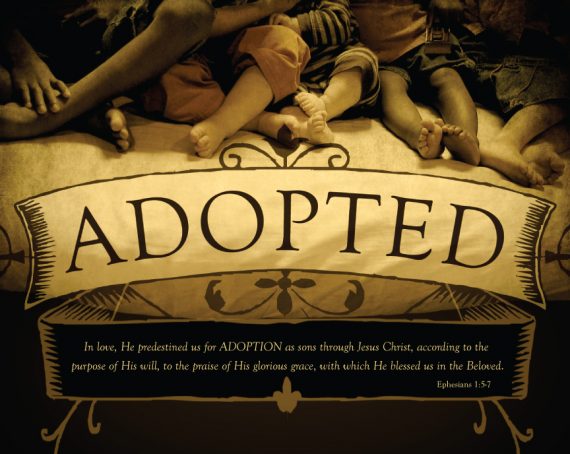
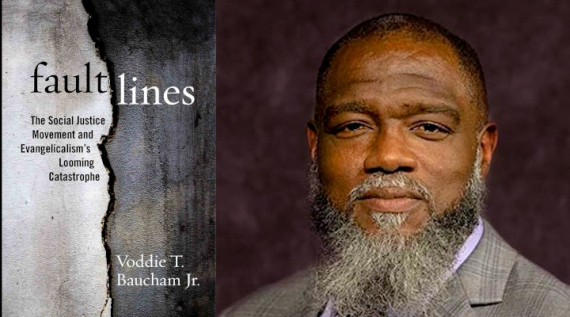

 In Ephesians 1:5, Paul writes that God predestined us to be adopted as his sons.
In Ephesians 1:5, Paul writes that God predestined us to be adopted as his sons. Paul, of course, was a Roman citizen, and the letters in which he mentions adoption were written to other Roman citizens, so it makes sense that Paul’s language about adoption matches the way it was practiced in Roman culture at that time.
Paul, of course, was a Roman citizen, and the letters in which he mentions adoption were written to other Roman citizens, so it makes sense that Paul’s language about adoption matches the way it was practiced in Roman culture at that time. That is what Paul says God is promising to us here. God has named us heirs. We are heirs of God and co-heirs with Jesus Christ. This promise of predestination is not about God deciding who gets to heaven and who goes to hell; it is about God decided that rather than just one son getting all of His inheritance, all of His children get to share in the inheritance of His family. What a wonderful promise and blessing for His children!
That is what Paul says God is promising to us here. God has named us heirs. We are heirs of God and co-heirs with Jesus Christ. This promise of predestination is not about God deciding who gets to heaven and who goes to hell; it is about God decided that rather than just one son getting all of His inheritance, all of His children get to share in the inheritance of His family. What a wonderful promise and blessing for His children!

 The Triumphal Entry sermon was first taught nearly twenty years ago … and the explanation on the ten talents was within the last year, so the contradiction here just shows a progression in my thinking…
The Triumphal Entry sermon was first taught nearly twenty years ago … and the explanation on the ten talents was within the last year, so the contradiction here just shows a progression in my thinking…
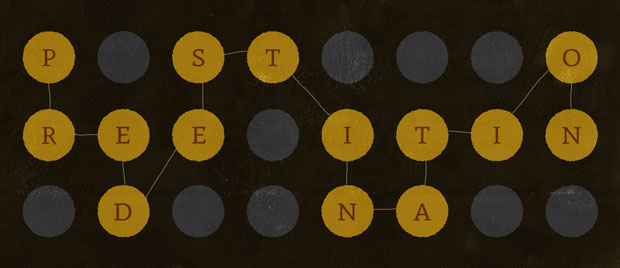
 I believe that predestination does not refer to God’s choice of which people get to go to heaven, but refers instead to God’s determination to bring into glory all those who receive eternal life by faith in Jesus. In other words, predestination teaches us about who gets glorified, not who gets justified.
I believe that predestination does not refer to God’s choice of which people get to go to heaven, but refers instead to God’s determination to bring into glory all those who receive eternal life by faith in Jesus. In other words, predestination teaches us about who gets glorified, not who gets justified.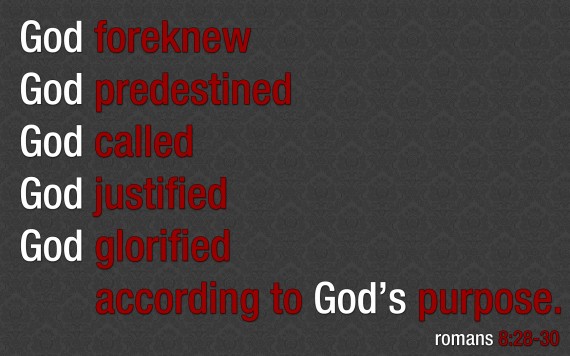



 Do you see the logic here? If we are going to say Jesus was elect, and that this means that He was chosen by God to perform a certain task, then the same meaning of election should apply to others also. And indeed, this is exactly what Scripture reveals when we study all the other passages on election in Scripture.
Do you see the logic here? If we are going to say Jesus was elect, and that this means that He was chosen by God to perform a certain task, then the same meaning of election should apply to others also. And indeed, this is exactly what Scripture reveals when we study all the other passages on election in Scripture.
 Well, that is what the rest of Ephesians is all about.
Well, that is what the rest of Ephesians is all about.

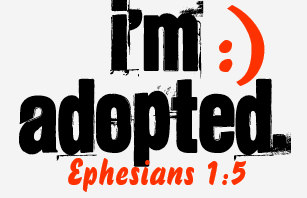 One famous example is when Julius Caesar adopted Octavian (who became Caesar Augustus) to be his heir, even though Octavian was not Caesar’s son. Caesar had a biological son with Cleopatra named Caesarion, but he was not named as heir.
One famous example is when Julius Caesar adopted Octavian (who became Caesar Augustus) to be his heir, even though Octavian was not Caesar’s son. Caesar had a biological son with Cleopatra named Caesarion, but he was not named as heir.
